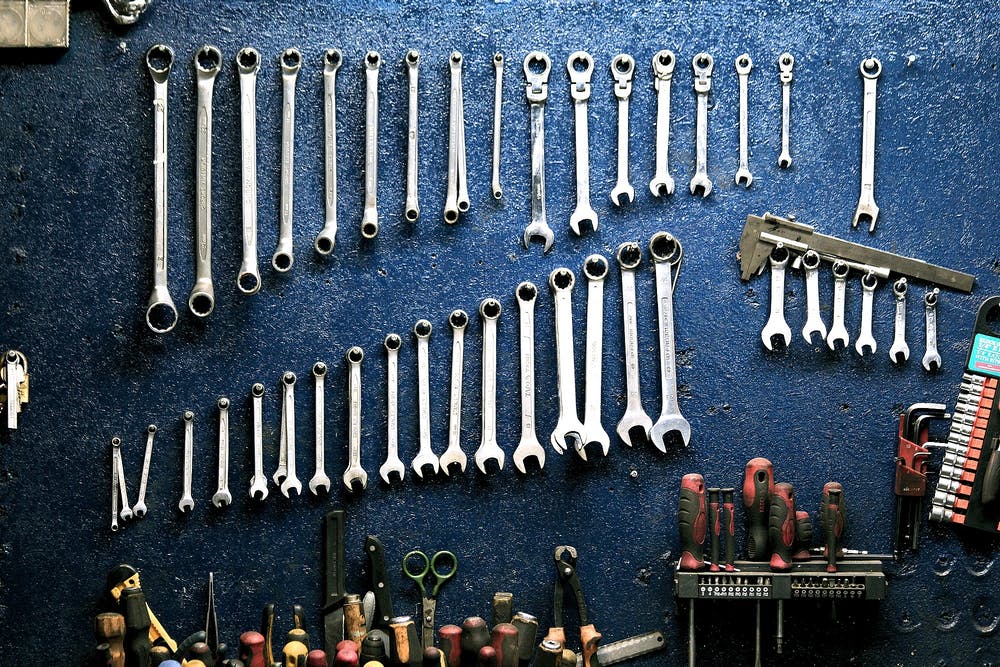Organizing your tools correctly is very important for maintaining a clean and uncluttered workspace. This article will provide you with tips on how to store your tools, as well as tips on what kind of tool storage solutions are available.
1. Storage sheds
Storage sheds are a great place to store your tools. They can be as big or as small as you need them to be, and they will keep the elements from damaging your tools. Many of these sheds come with shelves, so you’ll know exactly where everything is and won’t have to go searching for it when you’re in a hurry. Some people try to keep their tools outside, but that isn’t really good for the tools themselves — weathering can damage them or just cause them to pile up on each other once they get wet. This is why keeping them inside storage sheds is such a great idea. Just by owning one, you avoid the weather damage your tools would otherwise take, and it protects them from rodents and other pests. They can also be painted to fit in with the rest of your house’s decor. If you don’t like what they come with (seats, tables, shelves, etc.), you can easily remove them and replace them with your own furniture.
2. Drawer dividers and racks
Drawer dividers let you organize your tools by size so that nothing gets mixed together, and you can find exactly what you need quickly and easily. You can store anything from paints to screwdrivers in these containers, depending on how many drawers they come with. Some people also like investing in drawer units that are made out of metal instead of plastic, because they believe it wears better over time. They may be a little more expensive at first, but for most people this difference is negligible, so it’s up to you whether you want to choose metal drawers instead of plastic ones. Racks for your hand tools are another great way to keep everything organized properly. If you have a ton of different types of pliers lying around, it can be really difficult to find the one that you’re looking for. This isn’t a problem if you store them in racks that keep each tool separate from the rest. Every time you need one, you simply take it out of the rack and use it. Then, when you no longer need it, pop it back into place so that everything is neat and tidy again.
3. Magnetic strips and pegboards
Magnetic strips are great for storing small metal objects that you often use. Screwdrivers, wrenches, hammers, saws, and anything else of the sort will all stay in place when put on these strips. This means that you can grab what you require without having to rifle through drawers or shelves to find them, since they’ll already be right where they’re meant to be. They are especially great for keeping track of sharp tools like saws and knives because if you leave them on the floor somewhere, someone might trip over it. The magnetic strip keeps everything in its place so that your workspace remains free from clutter and accidents. Pegboards are another useful storage solution for all kinds of things. You can hang screwdrivers, wrenches, etc. on them so that you know exactly where to find every tool. It’s much faster to find what you need than if everything was thrown onto your workbench without any organization whatsoever.
4. Make use of your garage
If you don’t know what else to do with your garage, it’s a good idea to turn that into more storage space. There are many ways to go about this, and that all depends on what you want out of your new extra storage area. For example, if you have a ton of old knick-knacks or outdated items that you don’t use anymore but haven’t gotten rid of yet, it might be worth hanging shelves up in your garage for these things, so they’re not just taking up room in your house. Your tools may even help accomplish this goal because there are often dusty objects sitting around in toolboxes that can serve as decorations for these shelves once they’ve been put to use. If you already know exactly what you’re going to store in your new space, then you might want to invest in some storage units that can go up against a wall so that everything has its place instead of just being thrown onto the floor.
5. Have a place for everything
It’s just common sense that if you want to know where everything is, you have to have a specific spot for every single thing. This means that if something doesn’t fit on your pegboard or in its drawer, it goes somewhere else. I know this may seem like an obvious piece of advice, but if you can’t find your hammer because there are two hammers in the same place where one used to be, then this point becomes very important. You don’t want someone stepping on one of your tools accidentally or putting something on top of another tool where it shouldn’t be (like covering up your wrench with paint). Having different places for all of these things will ensure that they’re safe and sound when you need them most.
6. Store liquids separately
Liquids are very dangerous when they’re stored incorrectly because, if you don’t store them properly, they can spill and damage whatever you have sitting close to it. You might not want to let these liquids into your work area at all if that’s the case, but what you should do is ensure that there’s a designated place for everything. Placing paint in an old milk jug with a screw on lid is one way of doing this, just make sure that the cap is on tightly to reduce any chance of messing up whatever is surrounding it. Keep your paints together as well so that you know where to find them whenever you require something new. Some people like to keep things in separate rooms because they don’t want anything getting ruined, so they avoid mixing up liquids.
Storage and organization is important for any kind of work you intend to do. You should keep all possible ideas in mind when attempting to store your tools properly so that you know what to use every time you need a specific tool. Without proper storage, your workshop will become cluttered, so follow these tips, and you will be just fine.





















